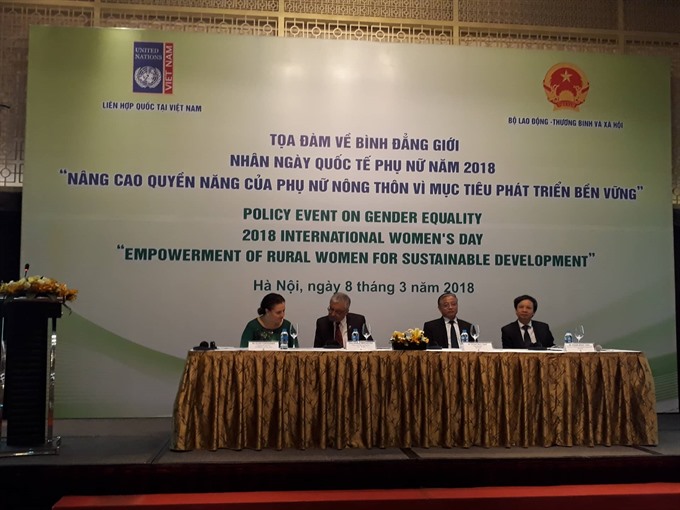 Society
Society

Việt
 |
| Officials from the United Nations and the Ministry of Labour, Invalids and Social Affairs chair the policy event. — VNS Photo Thu Trang |
HÀ NỘI — Việt
Experts agreed on that point at a policy event on “Empowering Rural Women for Việt
The event was organised in commemoration of International Women’s Day by the United Nations in Việt
According to the General Statistics Office’s 2016 report, although agriculture accounted for only 16.3 per cent of Việt
But, the report said, rural women often work at low-quality, unstable jobs with little access to social protection services. Although vocational training for rural women has been prioritised, such trainings are usually short-term. As such, women still face difficulties finding a decent job after the trainings. Moreover, their access to resources such as land, technology and financial services is also very restricted.
Besides, rural women are severely affected by climate change. However, their contributions to and experience in responding to climate change and natural disasters have not been adequately appreciated.
Doãn Mậu Diệp, deputy minister of Labour, Invalids and Social Affairs, said, "Today’s discussion is a good opportunity to promote the role and contribution of women and girls in rural areas, to review the successes as well as the challenges in achieving gender equality towards the advancement of women, and to find solutions to enhancing the empowerment of rural women and girls in the coming time”.
Kamal Malhotra, United Nations Resident Coordinator to Việt
“Only if we eliminate structural barriers and discriminations in law and practices to ensure equal opportunities and results for women, can we change the lives of rural women and girls,” he said.
Participants gave recommendations and suggestions on empowering rural women in Việt Nam, including requiring both targeted action and mainstreaming gender perspectives into all efforts in national planning, decision making, policy formulation and implementation; promoting an enabling environment for rural women and girls and their organisations to fully and actively participate in the decisions, policies and institutions that affect their livelihoods; building the resilience of rural women and girls to climate change and environmental degradation; and strengthening the capacity of national statistical offices and other relevant institutions to collect, analyse and disseminate sex- and age-disaggregated data and produce gender statistics to support policies and action for rural women and girls. — VNS